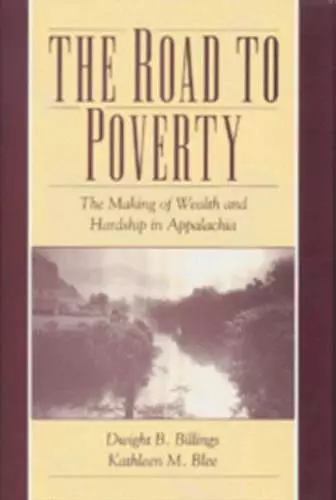The Road to Poverty
The Making of Wealth and Hardship in Appalachia
Kathleen M Blee author Dwight B Billings author
Format:Hardback
Publisher:Cambridge University Press
Currently unavailable, our supplier has not provided us a restock date
This hardback is available in another edition too:
- Paperback£44.99(9780521655460)

Kathleen Blee and Dwight Billings examine the social dynamics of persistently poor rural communities.
This book makes an important contribution to basic research on inequality - pointing to the shortcomings of treating symptomatic problems of low income, while failing to address systemic ones - at a time when American policymakers are struggling to design and implement effective programs to move people from welfare to work.Kathleen Blee and Dwight Billings examine the social dynamics of persistently poor rural communities through the history of Clay County, an especially poor section of the Eastern Kentucky mountains in Appalachia. The authors uncover the systemic problems and patterns of low income by tracing its socio-cultural, economic, and political development of Clay County from its earliest non-native settlement and agricultural development, to the advent of the coal industry, to the present day. This study of the long-term, institutional basis of rural poverty contains some fascinating, new local historical detail, based upon the authors' meticulous archival research. This book makes an important contribution to basic research on inequality - pointing to the shortcomings of treating symptomatic problems of low income, while failing to address systemic ones - at a time when American policymakers are struggling to design and implement effective programs to move people from welfare to work.
'Billings and Blee support their often fascinating and at times incredible report with a wealth of archival and contemporary data, grounded in a theoretically comprehensive and thoughtful analysis. Their book is a real eye opener for anyone who has ever wondered why Appalachia is, and has long been, so poor.' Herbert Gans, Columbia University
'Through an in-depth study of a rural community in one of the poorest regions of the United States, this study provides extraordinary insight into how poverty is created and sustained over time. By examining the historical interaction of capitalist markets, the local state and cultural forces, the authors show why and how dominant market-driven approaches to development have failed. Using this historical understanding, they call upon policy makers for a new approach to poverty alleviation - one that takes a long term view, that supports cultural strategies, and that recognizes the importance of the local state. The lessons and insights from this book will be of interest and relevance to those concerned with poverty, inequality and development, not only in rural America, but across the globe.' John Gaventa, Institute of Development Studies
'The Road to Poverty is a carefully researched and thoughtful analysis of social relations in Clay County, Kentucky over the past century. The result is a clear and convincing revelation of how 'capitalist markets, state coercion and cultural strategies' combined to set and keep central Appalachia on a road to persistent poverty. The book delivers a powerful message. Persistent poverty of a region is rooted in the history of its social (especially economic and political) institutions. Efforts to reduce poverty by focusing on individuals and families without attending to the social origins of persistent poverty are doomed to failure.' Gene F. Summers, University of Wisconsin-Madison
'Inquiry into Appalachian poverty has too long been held captive to cultural stereotypes and untested assumptions. In their illuminating study, Billings and Blee dispell many of these falsehoods and document how Appalachia's tragic past continues to haunt its tortured present. Poverty is not a natural condition either of individuals or regions, and by situating the early history of Appalachian in the dynamics of global capitalism, Billings and Blee demonstrate how Appalachia was made poor. This is an important book for social scientists and historians and essential for all students of Appalachia and regional development more generally.' Larry Griffin, Vanderbilt University
'It is a book built on patient research and observation, which will reward the patient reading of scholars and activists elsewhere trying to build community alternatives to clientelism.' Journal of the Royal Anthropological Institute
ISBN: 9780521652292
Dimensions: 238mm x 161mm x 31mm
Weight: 750g
448 pages